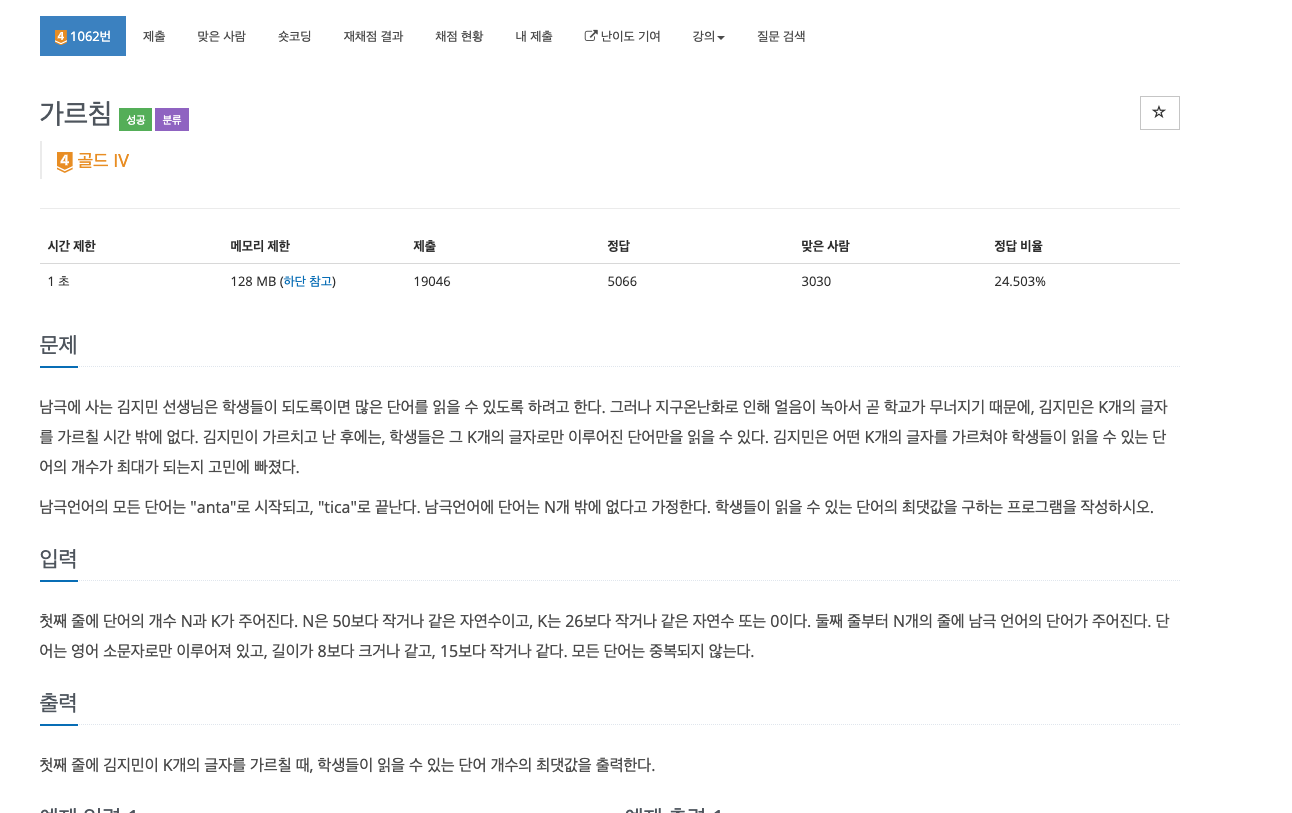#include <cstdio>
#include <vector>
#include <queue>
#include <iostream>
#include <cmath>
#include <algorithm>
#include <set>
#include <deque>
#include <numeric>
#include <map>
#define ll long long
using namespace std;
int N, K, ans;
int main() {
ios::sync_with_stdio(0);
cin.tie(0);
cout.tie(0);
cin >> N >> K;
map<char,bool> m;
map<char,bool> need_flag;
vector<string> sv;
char need[5] = {'a', 'c', 'n', 'i', 't'};
vector<char> v;
for(int i=0;i<N;i++)
{
string s;
cin >> s;
sv.push_back(s);
for(auto c : s)
{
if(c == 'a' or c == 'c' or c == 'n' or c == 'i' or c == 't')
need_flag[c] = true;
else m[c] = true;
}
}
if(K < 5){
cout << 0;
return 0;
}
for(int i=0;i<5;i++)
if(!need_flag[need[i]]){
cout << 0;
return 0;
}
for(auto it = m.begin();it != m.end();it++)
v.push_back(it->first);
int len = v.empty() ? 0 : v.size();
int ch[len];
fill(ch, ch+len, 1);
if(K-5 >= len){
cout << sv.size();
return 0;
}
for(int i=0;i<K-5;i++) ch[i] = 0;
do{
map<char,bool> tm;
for(int i=0;i<len;i++)
if(ch[i] == 0) tm[v[i]] = true;
int cnt=0;
for(int i=0;i<sv.size();i++)
{
string cur = sv[i];
bool flag= true;
for(auto a : cur)
if(a == 'a' or a == 'c' or a == 'n' or a == 'i' or a == 't'){
continue;
}else if(!tm[a]){
flag = false;
break;
}
if(flag == true) cnt++;
}
ans = max(ans, cnt);
}while(next_permutation(ch, ch+len));
cout << ans;
return 0;
}
- 로직
- 예외 처리
K가 5보다 작으면 종료 --> 필수 알파벳 5개 ('a' / 'c' / 'n' / 'i' / 't')는 있어야 하기 때문필수 알파벳 5개가 없으면 종료 --> 모든 단어에 들어가기 때문에 없으면 무조건 0필수 알파벳을 제외한 알파벳 수 <= K-5 이면 모든 알파벳을 알 수 있으니 단어의 총 개수가 정답
next_permutation()을 이용해서 가질 수 있는 알파벳 중 K-5개를 선택하는 조합으로 수행최대 카운트 세기
- 주의할 점
시간복잡도 미리 계산해보기
필수 알파벳를 제외하지 않고 총 26개중 알파벳 중에서 고르는 최대값인 26C13 = 약 1천만 경우의수최대 50개의 단어와 최대 15길이를 가짐- 총
1천만 * 50 * 15 = 약 7.5억 --> 시간초과
- 해법
: 필수 단어인 5개를 제외하면 21C10 -> 약 35000개의 연산으로 줄어듬
총 21C10 * 50 * 15 = 약 2600만 --> 시간 충분
- 예외 처리
: K-5가 현재 알파벳 개수보다 더 많으면 ch초기화시 범위를 벗어난다 --> 조심

